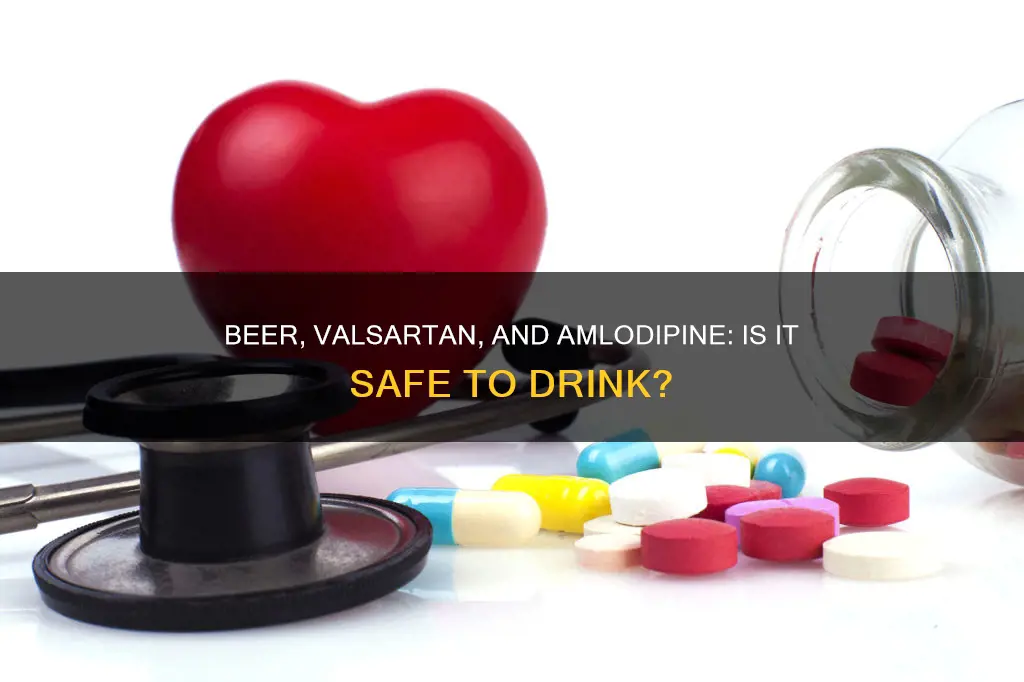
Drinking alcohol while taking medication can be dangerous, and it's generally advisable to avoid it. Mixing alcohol with medication can lead to serious health consequences, including overdose and even death. Alcohol can interfere with how medications work, and certain drugs can change how you feel the effects of alcohol. Alcohol can also worsen the side effects of some medications, and increase the risk of adverse medication reactions.
Amlodipine and valsartan are both medications used to treat high blood pressure. Amlodipine is also used to treat angina (chest pain caused by reduced blood flow to the heart). Both medications can be affected by alcohol. Mixing amlodipine and alcohol can increase the risk of side effects such as lightheadedness, dizziness, low blood pressure, or decreased effectiveness of the medication. Excessive alcohol consumption while taking amlodipine may lead to serious health consequences like cardiovascular events, especially during the initial phase of treatment. Meanwhile, valsartan and ethanol (found in alcoholic drinks) may have additive effects in lowering blood pressure, which can lead to dizziness, lightheadedness, fainting, and changes in pulse or heart rate.
Therefore, it is generally recommended to avoid drinking beer or other alcoholic beverages while taking amlodipine and valsartan, to reduce the risk of adverse health effects. It is important to consult a doctor or healthcare provider for personalized advice, as the risks and benefits may vary depending on individual medical history and other medications being taken.
| Characteristics | Values |
|---|---|
| Can you drink beer if taking valsartan and amlodipine? | It is not recommended to mix alcohol with any medication. However, if you are taking valsartan and amlodipine, drinking alcohol may cause additive effects in lowering your blood pressure. |
| What are the risks of drinking beer while taking valsartan and amlodipine? | Headache, dizziness, lightheadedness, fainting, changes in pulse or heart rate, liver toxicity, and increased risk of serious health consequences like cardiovascular events |
| What should you do if you are drinking beer while taking valsartan and amlodipine? | Avoid driving or operating hazardous machinery, use caution when changing body positions, and consult your doctor if symptoms persist or become troublesome. |
What You'll Learn
- Amlodipine and ethanol may have additive effects in lowering blood pressure
- Valsartan and ethanol may have additive effects in lowering blood pressure
- Mixing amlodipine and alcohol may increase the risk of side effects
- Drinking alcohol while taking valsartan may cause changes in pulse or heart rate
- Mixing alcohol with medication can be dangerous

Amlodipine and ethanol may have additive effects in lowering blood pressure
Amlodipine is a medication used to treat high blood pressure, coronary heart disease, and angina (chest pain). It is a calcium channel blocker that relaxes the blood vessels so that blood can flow through them more easily, and the heart does not have to work as hard.
Ethanol, or alcohol, can also have an effect on blood pressure and heart rate. It can cause an increase or decrease in blood pressure, depending on the amount consumed and the duration of consumption.
When amlodipine and ethanol are combined, they may have additive effects in lowering blood pressure. This can lead to a further decrease in blood pressure, which may be dangerous. In addition, the side effects of both substances may overlap and be amplified, including:
- Headache
- Dizziness
- Lightheadedness
- Fainting
- Changes in pulse or heart rate
- Skin flushing
- Low blood pressure
- Decreased effectiveness of amlodipine
The risk of experiencing these side effects is highest at the beginning of treatment, following a dose increase, or when treatment is restarted after an interruption. It is important to be cautious when getting up from a sitting or lying position, and to avoid driving or operating hazardous machinery until you know how the medications affect you.
Excessive alcohol consumption while taking amlodipine may also lead to serious health consequences, especially during the initial phase of treatment. It can damage the liver, where amlodipine is processed, potentially leading to increased liver toxicity and exacerbating existing liver conditions.
Therefore, it is generally recommended to avoid or limit alcohol consumption while taking amlodipine. It is important to consult with a healthcare provider for advice tailored to your specific medical history and other medications.
Beer and Type 2 Diabetes: What's Safe?
You may want to see also

Valsartan and ethanol may have additive effects in lowering blood pressure
Combining ethanol with valsartan may cause additive effects in lowering blood pressure. This can lead to a range of side effects, including headaches, dizziness, lightheadedness, fainting, and changes in pulse or heart rate. These side effects are most likely to occur at the beginning of treatment, following a dose increase, or when treatment is restarted after an interruption.
It is important to consult a doctor if these symptoms persist for several days or become troublesome. Individuals taking valsartan should also refrain from driving or operating hazardous machinery until they understand how the medication affects them. Moreover, caution should be exercised when rising from a sitting or lying position.
It is crucial to inform your doctor about all other medications, vitamins, and herbal supplements you are taking. They will provide guidance on whether it is safe to continue or discontinue the use of any substances.
In general, healthcare professionals recommend avoiding alcohol while taking blood pressure medications. Alcohol can cause temporary increases in blood pressure and interfere with the effectiveness of medications. It can also increase the risk of heart arrhythmias, falls, and severe drowsiness.
Beer and Penicillin: Safe Mix or Health Risk?
You may want to see also

Mixing amlodipine and alcohol may increase the risk of side effects
Alcohol can also affect blood pressure and heart rate. Drinking excessive amounts of alcohol can raise your blood pressure and make it harder for your medications to work. It can also cause an initial decrease in blood pressure, followed by an increase 12 hours after consumption. This interference can be dangerous for people taking blood pressure medication.
Mixing amlodipine and alcohol can increase the risk of side effects such as lightheadedness, dizziness, low blood pressure, or decreased effectiveness of amlodipine. The side effects of amlodipine and alcohol may also overlap and be amplified when the two are combined. For example, both amlodipine and alcohol can cause flushing of the skin, so drinking alcohol while taking amlodipine may increase the occurrence and severity of this side effect.
Drinking excessive amounts of alcohol can also damage the liver, where amlodipine is processed, potentially leading to increased liver toxicity or exacerbating existing liver conditions. Long-term heavy alcohol use can lead to severe liver damage, so it is important to monitor any changes in liver enzymes while taking amlodipine and alcohol together.
The occurrence and severity of side effects when mixing amlodipine and alcohol can depend on several factors, including the dosage of amlodipine, the amount of alcohol consumed, and whether they are taken together or within hours of consuming either substance. People with alcohol abuse disorder or those who binge drink may be at a higher risk of severe complications.
It is important to note that the effects of mixing alcohol and antihypertensive medications like amlodipine may depend on a person's overall health, the amount of alcohol consumed, and the duration of usage. Therefore, it is always recommended to consult a healthcare professional before consuming alcohol while taking any medication, especially if you have any existing medical conditions or are taking other medications.
Baylor Football: Beer Drinking Allowed?
You may want to see also

Drinking alcohol while taking valsartan may cause changes in pulse or heart rate
As a result of this interaction, you may experience side effects such as headache, dizziness, lightheadedness, and fainting. These side effects are most likely to occur at the beginning of treatment, following a dose increase, or when treatment is restarted after an interruption.
It is important to note that drinking alcohol can also raise your blood pressure and make it harder for your blood pressure medications to work. This may lead to serious health consequences, especially during the initial phase of treatment.
Therefore, it is generally recommended to avoid mixing alcohol and valsartan. If you choose to drink alcohol, it is important to do so in moderation and always consult your doctor.
- Avoid driving or operating hazardous machinery until you know how the medications affect you.
- Use caution when getting up from a sitting or lying position, as you may feel dizzy or lightheaded.
- Inform your doctor about all other medications, vitamins, and herbal supplements you are taking.
- Do not stop using any medications without first talking to your doctor.
Beer and Fishing: A Match Made in Heaven?
You may want to see also

Mixing alcohol with medication can be dangerous
For example, when taking the blood pressure medication amlodipine, mixing it with alcohol can increase the risk of side effects such as lightheadedness, dizziness, low blood pressure, or decreased effectiveness of the medication. Excessive alcohol consumption while taking amlodipine may also lead to serious health issues like cardiovascular events, especially during the initial phase of treatment. This is because drinking excessive amounts of alcohol can damage the liver, where amlodipine is processed, potentially leading to increased liver toxicity or exacerbating existing liver conditions.
Similarly, when taking valsartan, another blood pressure medication, mixing it with alcohol can also have additive effects in lowering blood pressure. This can result in side effects such as headaches, dizziness, lightheadedness, fainting, and changes in pulse or heart rate. These side effects are typically seen at the beginning of treatment, following a dose increase, or when treatment is restarted after an interruption.
In general, drinking alcohol while taking any blood pressure medication is not recommended. Regular alcohol consumption can raise blood pressure and interfere with the effectiveness of medications. Heart arrhythmias, falls, and severe drowsiness are some of the potential consequences of mixing alcohol with blood pressure medications. It is always best to consult with a healthcare professional to understand the specific risks and precautions based on your medical history and other medications you may be taking.
Additionally, alcohol can have different effects on individuals, and it may interact with medications in various ways. Even small amounts of alcohol can impair your ability to drive or operate machinery. Mixing alcohol with certain medications can lead to falls and serious injuries, especially among older people. It is crucial to be aware of the potential risks and always consult a healthcare provider if you have any questions or concerns about mixing alcohol with your medication.
Asking for Beer Outside Gas Stations: Does It Work?
You may want to see also
Frequently asked questions
It is not recommended to mix alcohol with any blood pressure medication, including amlodipine and valsartan. Mixing alcohol with blood pressure medication can lead to side effects such as dizziness, lightheadedness, fainting, headache, and changes in pulse or heart rate.
Valsartan and ethanol (found in alcoholic drinks) may have additive effects in lowering your blood pressure. You may experience side effects such as dizziness, lightheadedness, fainting, headache, and changes in pulse or heart rate. These side effects are most likely to occur at the beginning of treatment, following a dose increase, or when treatment is restarted after an interruption.
Mixing amlodipine and alcohol can increase the risk of side effects such as lightheadedness, dizziness, low blood pressure, or decreased effectiveness of amlodipine. Excessive alcohol consumption while taking amlodipine may lead to serious health consequences like cardiovascular events, especially during the initial phase of treatment.







